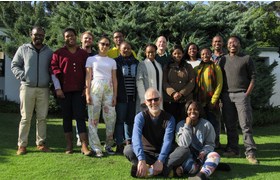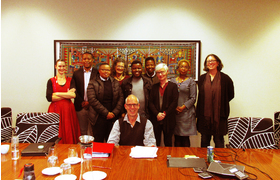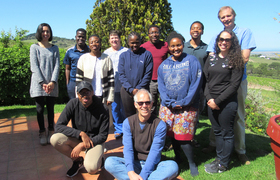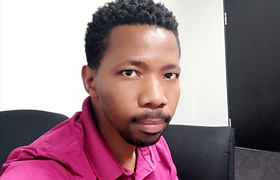nGAP during the time of COVID-19
29 April 2020 | Story Robert Morrell. Photo Nosipho Mzenzi. Read time 3 min.
Things have been quiet for members of the New Generation of Academics Programme (nGAP) cohort since the University of Cape Town (UCT) – and the country – responded to the first cases of COVID-19 infection. Since then, UCT steadily put measures in place to enforce social distancing, reduce risk and eventually followed the president’s decree into lockdown.
Meetings of the nGAP cohort have ceased, although communication has not. Email and other technologies have ensured that the cohort remains united. Dr Linda Price is offering a space for members to meet virtually via Zoom to have coaching conversations. These are designed to share experiences of academic life within the context of the current uncertain and challenging work and social contexts.
“Familiar boundaries between work and personal life are far less delineated than in the past, and we tend to fulfil various life roles within one space,” said Price. “It can therefore be helpful to identify the many relationships that comprise our lives and put structures in place to meet their different requirements.”
Writing retreat
The cohort was fortunate to have the first writing retreat of the year scheduled in the first week of March, before the COVID-19 restrictions were put in place. Zevenwacht Wine Estate played host again and the 13 people who attended all confirmed, again, that it was a very productive and congenial time.
We were fortunate to have on the retreat Professor Ojelanki Ngwenyama (Department of Information Systems, UCT) and Professor Hanne Westh Nicolajsen (IT University of Copenhagen). Professor Ngweynama supervises the doctoral studies of Ayanda Pekane, an nGAP member.
Further posts awarded in Phase 6
A few months ago, UCT received the news that it had been awarded a further five posts in Phase 6 of nGAP. These are in the following departments: civil engineering; environmental health; information systems; mathematics and applied mathematics; and theatre, dance and performance studies. This is the third time that UCT has been awarded a full house (the maximum of five posts permitted by the application process).
In this newsletter we introduce three newly appointed Phase 5 lecturers. Colin du Sart (mechanical engineering), Dylan Valley (film and television studies) and Bianca Arendse (organisational psychology). We also introduce Dr Maxwell Chirewha, a new nGAP associate from the Department of Clinical Pharmacology.
We heard about the achievement of Melissa-Rose Abrahams in being the lead author on a groundbreaking paper in Science Translational Medicine, and Musa Nxele takes us on a journey to Paris.
 This work is licensed under a Creative Commons Attribution-NoDerivatives 4.0 International License.
This work is licensed under a Creative Commons Attribution-NoDerivatives 4.0 International License.
Please view the republishing articles page for more information.
New Generation of Academics Programme (nGAP)
UCT has responded energetically to the New Generation of Academics Programme (nGAP), an opportunity provided by the Department of Higher Education (DHET) to build a new generation of black South African academics. The DHET’s 2015 vision document, “Staffing South Africa’s Universities Framework: A comprehensive, transformative approach to developing future generations of academics and building staff capacity”, proposes a suite of initiatives to address the challenge, with nGAP being the major instrument to increase the numbers of black South African academics.
The programme “involves the recruitment of highly capable scholars as new academics, against carefully designed and balanced equity considerations and in light of the disciplinary areas of greatest need”. The nGAP scholars are appointed into permanent positions where from the outset their conditions are customised to ensure their successful induction into the ranks of established academics.
The DHET provides funding over a six-year period to support the appointment of an nGAP lecturer, and their time is protected to provide the best possible opportunity for the completion of a doctorate degree in the shortest possible time. Once the degree is completed, the nGAP lecturer’s teaching commitments are steadily increased until they shoulder a full teaching load.
Since the first advertisement for nGAP posts in 2015, UCT has been awarded 17 nGAP positions: 5 (Phase 1), 4 (Phase 2), 3 (Phase 3) and 5 (Phase 4). These are distributed across all faculties.
UCT’s nGAP scholars operate as a single cohort, managed and coordinated by Dr Robert Morrell. Lecturers meet for quarterly meetings, writing retreats and various capacity-building activities all designed to support the completion of postgraduate qualifications (particularly doctorates) and to develop records of achievement that will testify to their emergence as self-standing, excellent academics. Each lecturer is mentored by a senior scholar, who provides support and guidance on the challenges that routinely face academics.
The nGAP manager sets great store in building the cohesion of the cohort and encouraging the establishment of new UCT networks while producing a collaborative, mutually supportive and embracing work culture.
According to Dr Morrell, “This group of academics will lead UCT in 15 to 20 years’ time ... Their vision of excellence, of being African and South African, of serving a wider community and producing knowledge for the planet, the continent and the country, will power UCT in years to come.”
Newsletters
In the news









































